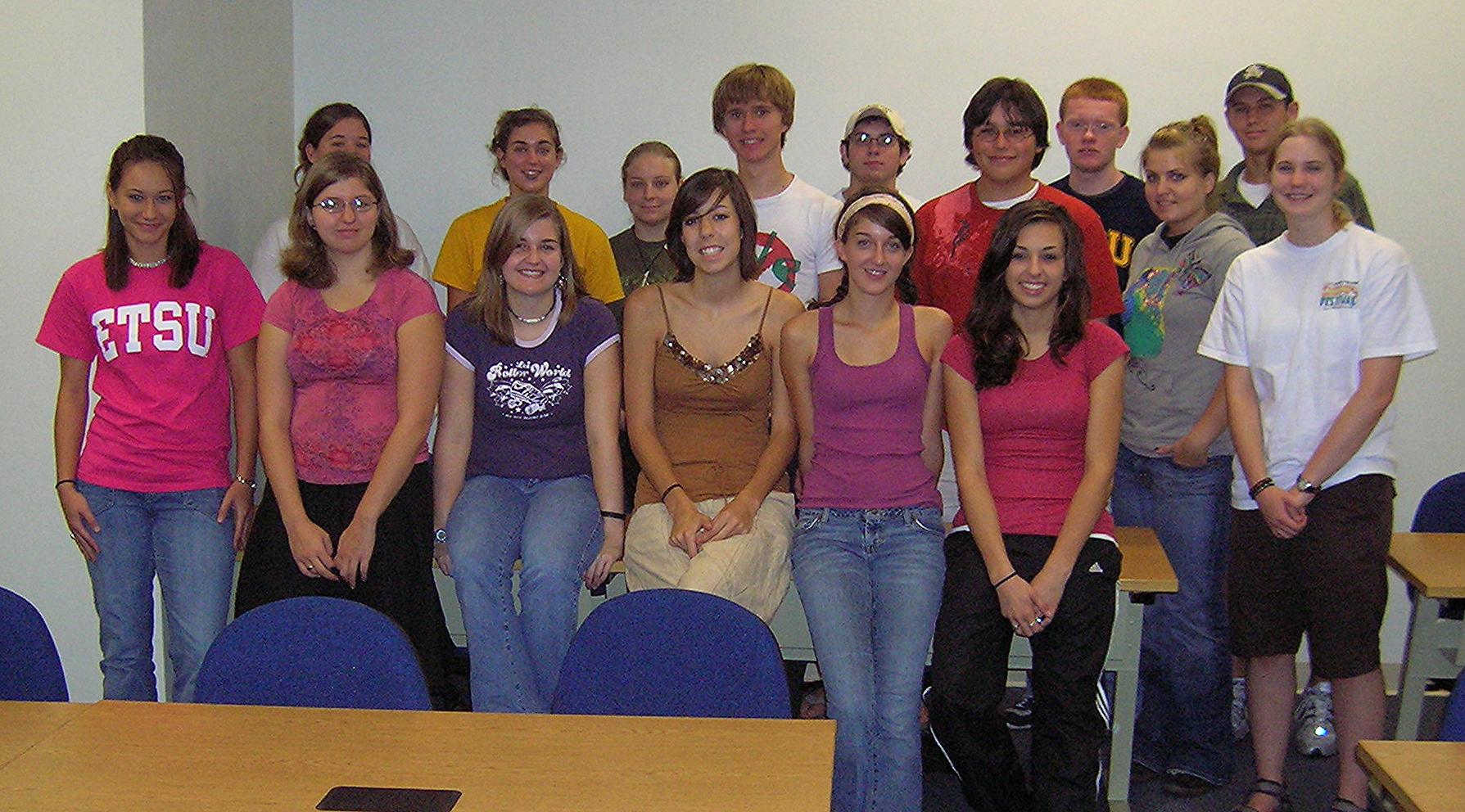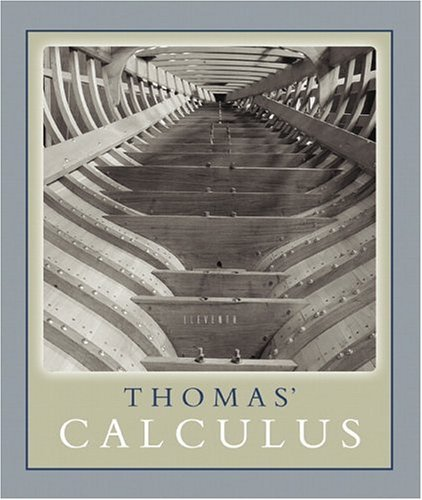
Fall 2007

COURSE: MATH 1910-088
CALL #33495
TIME AND PLACE: 9:20-10:15 MWF in Sam Wilson 209, 5:00-6:00 R in Brown Hall 476
INSTRUCTOR: Dr. Robert Gardner
OFFICE HOURS: 10:15-11:15 MWF
OFFICE: Room 308F of Gilbreath Hall
PHONE: 439-6979 (308F Gilbreath), Math Department Office 439-4349
E-MAIL:
gardnerr@etsu.edu
WEBPAGE:
www.etsu.edu/math/gardner/gardner.htm
(see my webpage for a copy of this course syllabus, copies of the classnotes in PDF and PostScript formats, and updates for the course).
TEXTS: Thomas' Calculus, 11th edition, by G. Thomas, R. Finney, M. Weir, and F. Giordano. The Calculus Wars by J. Bardi.

|

|
SAMPLE TESTS: Copies of old tests, along with solutions, are available through online reserve on the Sherrod Library website. Go to the ETSU Web Catalog (http://libraries.etsu.edu/) and under "Other Searches" click on "Course reserve." Then click the "Instructor" tab and submit my name. Select Calculus 1 from the list and then you will be allowed access to a PDF copy of sample tests. Be warned that the sample tests are from the standard non-honors-enhanced version of Calculus 1!
ONLINE CLASS NOTES: Class notes will be given primarily in the form of overheads. Definitions, theorems, some proofs, and a few examples will be included on the overheads. Most examples and questions concerning homework problems will be written on the board. Copies of the overheads are on reserve in the library, in the Math Lab, and online at:
ADDITIONAL RESOURCES: Instructor's Solution's Manual by M. Weir, contains worked-out solutions for all exercises in the text. Answer Book contains short answers to most exercises in the text. Student Study Guide by M. Weir, gives study tips and additional practice. Student Solutions Manual by M. Weir contains worked-out solutions to all odd-numbered exercises in the text. A copy of each of these additional resources will be on reserve in the library.
PREREQUISITES: As the ETSU catalog states, the prerequisites for this class are either two years of high school algebra and one year of plane geometry or Precalculus (MATH 1720). You must be familiar with the behavior of functions, their domains, their compositions, and piecewise defined functions. Additionally, you must either be an honors scholar and an honors-in-discipline math major.
GRAPHING CALCULATORS: "The designated calculator for Calculus I, II, and III will be the TI89. The TI92 is also suitable" [Schedule of Classes Bulletin, Fall 2007, ETSU, p. 72].
 |
 |
GRADING: Your grade will be determined by the average on four tests (T1-T4), the comprehensive final (F), and the Calculus Wars report and presentation (CW). Your average is determined by
THE CALCULUS WARS PROJECT: We will read and discuss The Calculus Wars - Newton, Leibniz, and The Greatest Mathematical Clash of All Time by Jason Bardi. Your participation in class discussions of the book is assumed. In addition, the class will be partitioned into groups of three and choose a topic related to The Calculus Wars. The group will give a written report on the topic and an in-class presentation. The written reports are due December 3 and the presentations will be given December 3 and 4. A group grade will be given with each member of the group getting the same grade.
Here's some resources resulting from our discussions:
Here's an online copy of "The Early Mathematical Manuscripts of Leibniz". A copy of the first use of an integral sign in Leibniz's own writing (dated October 29, 1675) is available here.
THE FINAL: We will have a comprehensive final on Monday, December 10 from 8:00 a.m. to 10:00 a.m.
GATEWAY EXAM: You must pass a "Gateway Exam" to complete this course. I quote from the "Calculus 1 Gateway Exam" webpage (math.etsu.edu/calculus/gate1ann.htm): "You cannot pass Calculus I, [MATH 1910] until you pass the Gateway exam.
Because we now require the powerful TI-89 calculator and encourage its use throughout calculus, Gateway exams in calculus have been established to insure that students are still developing pencil and paper computational skills.
In Calculus I, [MATH 1910], the gateway exam covers limits and derivatives of polynomials, algebraic functions and trigonometric functions. Once implicit differentiation has been covered in Calculus I, you may take the gateway exam 1 time each week until the next to last week of class.
Gateway Exams can be taken the last week of class only by permission of the Calculus coordinator. Now gateway testing will be offered in the math lab during the last week of class.
The examination consists of 10 multiple choice questions and has a 30-minute time limit. A score of 7 out of 10 is required for completion of the course. The purpose of the examination will be to assess each student's acquisition of the basic skills in Calculus. Therefore, NO CALCULATORS OF ANY KIND MAY BE USED DURING THE EXAMINATION.
NOTE: Passing the gateway examination does not guarantee a passing grade for the course."
This exam will be administered in the Math Lab. A sample Gateway Exam can be found on the internet at: math.etsu.edu/calculus/gate1htm.htm. If you take the Gateway Exam before the second in-class test, then I will give you your score on the Gateway Exam as bonus points on Test 2.
MATH LAB: The Mathematics Laboratory is located in Room 309 of Warf-Pickle Hall. It is staffed by graduate students and upper level undergraduates. They are there to help you! Hours of operation are Monday-Thursday 11:00-7:00, Sunday 1:00-5:00. The phone number is 439-7611. The Math Hotline is 439-7887 (for short questions).
ONLINE HELP: The Addison Wesley Longman Math Tutor Center is available online at www.awl.com/tutorcenter. It provides assistance to students who take calculus and purchase a mathematics textbook published by Addison Wesley Longman. Help is provided via phone, fax, and e-mail. Students who use the service will be helped by tutors who are qualified mathematics instructors.
CD-ROM AND WEB SITE: The CD-ROM included with the text has several interactive features and tutorials. It includes video clips of real-world situations which provide motivation for learning and applying calculus. The text web site (www.awl.com/thomas) has the "Just-in-Time" Online Algebra and Trigonometry web-based testing and tutorial system which allows students to practice the algebra and trigonometry skills critical to mastering calculus. The Interactive Calculus Tutorial is an online tutorial which lets students review textbook-specific material by chapter through practice quizzes and diagnostic feedback on their performance. The Skill Mastery Quizzes are a collection of chapter-by-chapter quizzes on the web site which can be administered and graded online for skills-based mastery assessment.
STUDENT SUPPORT SERVICES: Student Support Services provides free individual tutoring to qualified individuals through their NEXUS program. The criteria state that the student must be: (1) a first-Generation College student, meaning, neither of your natural parents has completed a four-year college degree, (2) income eligible, or (3) a student with a documented disability. For more details, see: www.etsu.edu/sss/.
DESIRE2LEARN: I have created an extensive discussion list on the Desire2Learn ("elearn") website. There is a discussion forum for each section of the calculus book, each test, and each chapter of The Calculus Wars book. You can log in at: elearn.etsu.edu/. I will not likely post other material on Desire2Learn, but will simply post it directly on the internet.
SYLLABUS ATTACHMENT: You can find an on-line version of the university's syllabus attachment (which contains general information concerning advisement, honor codes, dropping, etc.) at: www.etsu.edu/reg/syllabus.htm and www.etsu.edu/reg/SYLLABUS%20ATTACHMENT%20FALL%202007.pdf.
NOTE: Calculus is the "mathematics of motion." We will see many applications of the Calculus 1 material which involve motion and dynamics. Because of this connection with the physical sciences, calculus is one of the most applicable areas of mathematics. You will see many of the concepts in this class again if you take the Technical Physics sequence. This material is certainly not easy, though! You should plan on investing a great deal of time in this class. If you allot an appropriate amount of time for your studies (at least 2 hours outside of class for each hour spent in class) then I think this can be a pleasant and rewarding (intellectually and gradewise) experience! I will post test solutions outside of my office door (in Gilbreath) after each test. As a result, I will only consider questions about how your test was graded during the week following a test.
IMPORTANT DATES:
Monday, September 3 = Labor Day Holiday.
Friday, September 7 = Last day to drop without a grade of "W."
Monday, September 10 = Last day for 75% refund.
Thursday, September 19 = Test 1 (2.1-2.7).
Thursday, October 11 = Test 2 (3.1-3.8).
Monday, October 15 = Fall Break Holiday.
Monday, October 22 = Last day to drop without dean's permission.
Thursday, November 1 = Test 3 (4.1-4.8).
Thursday and Friday, November 22 and 23 = Thanksgiving Holiday.
Thursday, November 29 = Test 4 (5.1-6.2).
Tuesday, December 5 = Last day to withdraw from the university.
Friday, December 7 = Last day of class.
Monday, December 10 = Comprehensive final, 8:00 a.m. to 10:00 p.m.
We will follow this tentative outline. "EOO" means Every Other Odd (that is, 1, 5, 9, 13, etc.). Notice that, on average, we spend more time on the sections of the first two chapters (since this is where many fundamentally new concepts are introduced). Also notice that each test is scheduled on a Thursday.
Calculus Wars: Preface, Chapters 1-3 | ||
Calculus Wars: Chapters 4 and 5 | ||
Calculus Wars: Chapters 6 and 7 | ||
Calculus Wars: Chapters 8-10 | ||
Calculus Wars: Chapter 11 and Epilogue | ||
Return to
Bob Gardner's home page.
Last updated: November 11, 2007.